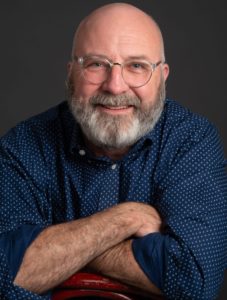Maybe this is simply stating the obvious, but here goes: There is a pattern to what is happening in the United Methodist Church, the Southern Baptist Convention, the Episcopal Church, the Presbyterian Church and other American churches. And that pattern bears a distinct relationship to what is happening in national and international politics.
All these events are part of the same cloth.

Mark Wingfield
On one hand, the common thread is authoritarianism and a quest for doctrinal purity. On the other hand, the common thread is a quest for freedom of conscience and adaptation to modernity.
Others have written more eloquently on the differences between conservative and liberal brains. (See George Lakoff and Jonathan Haidt, for example.) That intrinsic dichotomy certainly drives the present predicaments. But there’s more going on here than genetic brain differences; we’ve had those forever without the brutal state of modern theological and political warfare.
The church in America — and perhaps elsewhere, but I’m not qualified to speak on that — is at war within itself. And there truly is no middle ground. There is a brand of theological authoritarianism or extremism that so desperately must get its way that no tactic, no meanness, no betrayal of friendship is too great a cost.
“There is a brand of theological authoritarianism or extremism that so desperately must get its way that no tactic, no meanness, no betrayal of friendship is too great a cost.”
Now, before you accuse me of laying all the blame on one side in the fight, I’ll own up to that charge. This is not a “both sides are guilty” struggle. Conflict-averse people always want to claim that stance, as though they alone live in the “middle” and can cast judgment on both the right and the left. That’s arrogant and wrong and dangerous.
These are not debates about whether one person likes Coke and another likes Pepsi, so we should all meet in the middle and drink Dr Pepper. No, these debates boil down to the question of human dignity and the nature of God.
What unites all these denominational fights — as well as our political wars — is the question of free will and self-determination, of what Baptists call the priesthood of all believers and what the Declaration of Independence calls the truth that all people are created equal.
The American right — in both politics and theology — has defined itself by what it is against. It is against the inclusion of gays and lesbians. It is against the welcome of refugees and immigrants. It is against leadership by women. It is against abortion in all cases regardless of circumstances. It is against compromise. It is against reading sacred texts and founding documents in light of modernity. It is against scientific discovery. It is against empowering minorities. It is against scholarship. It is against allowing people to think for themselves. It is against freedom of thought. It is against the idea that God might have told me something different than you believe God told you.
The schism in the United Methodist Church is only the latest illustration of this phenomenon. The Wesleyan Covenant Association is the isolationist wing of the global denomination. Not only does it embrace a narrow view of theology and church polity, it demands that everyone else bow to its view. And in the greatest of ironies, this far-right segment of dis-United Methodists is more Calvinistic in its theology than a lot of Calvinists.
“And in the greatest of ironies, this far-right segment of dis-United Methodists is more Calvinistic in its theology than a lot of Calvinists.”
Ditto for the latest schism in the Southern Baptist Convention, which is being fueled by a strident group of neo-Calvinists who are absolutely convinced that they alone have the divine word from God and everyone else ought to conform to their will. I want to feel sorry for the plain-old conservatives in leadership in the SBC, except for the fact that they continue to paint people like me and BNG as the real enemy rather than acknowledge the flame-throwing tactics of their real adversaries internally.
Look, I’m a veteran of the first SBC schism of the 1980s and 1990s. I’ve got the scars to prove it but also the memory to give context. And here’s what I know for a fact: Today’s far-right Calvinist warriors in the SBC used to be the discredited fringe until the run-of-the-mill fundamentalists drove away the moderates and progressives and thereby shifted the playing field. Today’s institutionalists in the SBC used to be the center-right in the SBC but now they appear to be leftists to the other side in the internal debate. When I heard Al Mohler being called a “liberal,” I knew the SBC had fallen through the rabbit hole into its own Wonderland.
Here’s a prediction for Methodists based on this experience: However your schism works out, the playing field of who is left and who is right, who is conservative and who is liberal, will shift. And you are likely to find yourself in a new place where others label you in ways you don’t accept.
This is exactly what has happened in national politics. With the ascendancy of isolationist, mean-spirited, unethical, unchristian right-wing partisans, those who used to be center-left and moderate Republicans have fled. The effect is that today those claiming to be conservative have become even more rigidly and extremely anti-democratic (see Marjorie Taylor-Greene as Exhibit A), and anyone who doesn’t bow down to their leaders and insane views gets labeled an outcast or a liberal (see Liz Cheney as Exhibit B).
Again, all these things are related. In both religion and politics, the threat of modern science, modern theology, modern culture, modern reason has become the bright line we’re not allowed to cross. There is a theological equivalent to the Heritage Foundation’s test of “originalism” for court interpretation of the Constitution, and that is a “literal” interpretation of the Bible. And literalists, whether interpreting the Bible or the Constitution, conveniently position themselves as the only ones having the correct “original” interpretation.
“There is a theological equivalent to the Heritage Foundation’s test of ‘originalism’ for court interpretation of the Constitution, and that is a ‘literal’ interpretation of the Bible.”
An originalist approach is not viable in either case, anyway, because we do not live in those original times. The original authors of the Constitution believed in human slavery, and the original authors of the Bible believed the earth was the center of the universe.
But even more than that, both the Constitution and the Bible teach us the importance of freedom of thought and freedom of conscience — something the far-right in religion and politics want to deny.
And there’s this important lesson as well: History almost always judges the “orthodox inquisitors” more harshly than the “heretics” they literally or figuratively burned at the stake.
Mark Wingfield serves as executive director and publisher of Baptist News Global.
Related articles:
Pew study offers some surprising insights to American views on suffering, salvation, heaven and hell
‘Originalism’ at Kavanaugh hearings: echoes of SBC ‘inerrancy’ debate | Opinion by Stan Hastey
Gorsuch’s ‘one-sided’ view on religious freedom worry some, while conservatives express support


